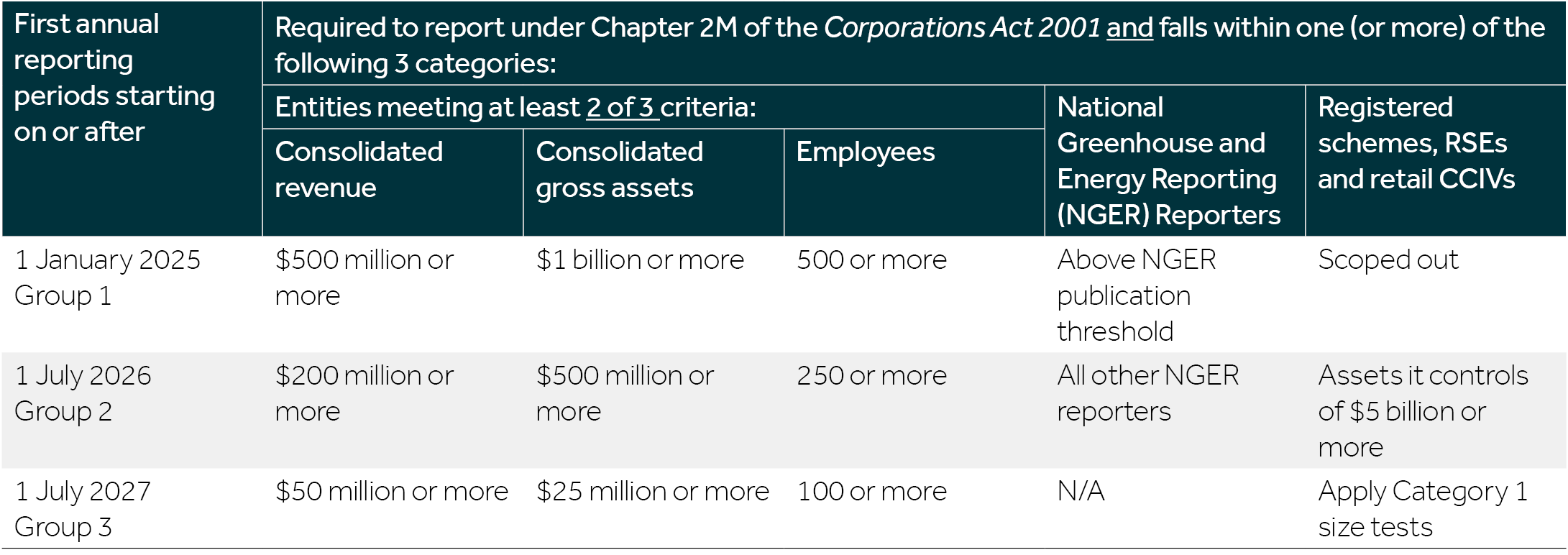Welcome to Beyond the numbers, our monthly newsletter which brings you a summary of the latest developments from local and international standard setters and regulators.
Click on one of the Newsletter sections below:

Mandatory climate-related reporting nearer
On 22 August 2024, the Senate passed the Treasury Laws Amendment (Financial Market Infrastructure and Other Measures) Bill 2024 with some amendments. The Bill amends the Corporations Act 2001 to introduce staged mandatory climate-related disclosures for entities reporting under Chapter 2M of the Corporations Act 2001.
The Senate amendments mandate disclosure of scenario analyses based on at least the following two climate scenarios:
- an increase in the global average temperature of 1.5°C (a low global warming scenario referenced in the Climate Change Act 2022); and
- an increase in the global average temperature of at least 2.5°C above pre‑industrial levels (being an increase that well exceeds the high global warming scenario of 2.0°C referenced in the Climate Change Act 2022).
The Opposition’s proposal to remove Group 3 entities from mandatory climate reporting failed in the Senate.
The Bill now returns to the House of Representatives, which next sits on 9 September 2024, where it is expected to be passed without further amendment given the Government’s support for the Senate-approved Bill.
When enacted, mandatory climate-related reporting will phase in as follows:

Not-for-profit entities that report under Chapter 2M of the Corporations Act 2001 and meet the climate reporting size thresholds will be subject to mandatory climate reporting based on the above timetable.
Meanwhile, the Australian Accounting Standards Board (AASB) has completed its substantive deliberations on its Australian Sustainability Reporting Standards (ASRS), which it expects to issue after the passage of the Bill.

AASB finalising climate-related standards
The AASB has completed its substantive deliberations on its Australian Sustainability Reporting Standards (ASRS).
ASRS will initially comprise two standards:
- AASB S1 ‘General Requirements for Sustainability-related Financial Information’, a voluntary standard that will be equivalent to IFRS S1 ‘General Requirements for Sustainability-related Financial Information’; and
- AASB S2 ‘Climate-related Disclosures’, a mandatory standard that will be aligned to IFRS S2 ‘Climate-related Disclosures’ with modifications to eliminate references to industry-based disclosure topics in the SASB Standards and Industry-based Guidance on Implementing IFRS S2 and not mandate the disclosure of industry-based metrics.
Not-for-profit entities reporting under Chapter 2M of the Corporations Act 2001 and meeting the climate reporting size thresholds will be required to apply AASB S2.
While the voluntary AASB S1 can be issued by the AASB, AASB S2 is subject to the passage of the Treasury Laws Amendment (Financial Market Infrastructure and Other Measures) Bill 2024. Nevertheless, it is expected that the effective dates of both AASB S1 and AASB S2 will be for financial years beginning on or after 1 January 2025.
AASB to propose removal of special purpose financial statements for some Not-for-profit entities
The AASB will consider its exposure draft to remove the ability of some Not-for-profit (NFP) entities from preparing special purpose financial statements at its board meeting on 5 – 6 September.
The proposals would mirror the requirements introduced for for-profit entities in 2022. Namely, general purpose financial statements would be required by not-for-profit entities that:
- are required by legislation to prepare financial statements that comply with either Australian Accounting Standards or accounting standards; or
- are required by their constituting document or another document to prepare financial statements that comply with Australian Accounting Standards created or amended on or after the application date; or
- elect to prepare general purpose financial statements.
A second exposure draft will introduce a reduced Tier 3 reporting framework for smaller NFP entities.
AASB 2024-2 Amendments to Australian Accounting Standards – Classification and Measurement of Financial Instruments
The AASB recently issued AASB 2024-2 Amendments to Australian Accounting Standards—Classification and Measurement of Financial Instruments. This Standard amends AASB 7 Financial Instruments: Disclosures and AASB 9 Financial Instruments for the requirements related to:
- settling financial liabilities using an electronic payment system;
- assessing contractual cash flow characteristics of financial assets with environmental, social and corporate governance (ESG) and similar features; and
- disclosures about financial instruments with contingent features that do not relate directly to basic lending risks and costs; and investments in equity instruments designated at fair value through other comprehensive income.
The Standard is effective for financial periods beginning on or after 1 January 2026, with early adoption permitted.
ED 332 Classification and Measurement of Financial Instruments: Tier 2 Disclosures
The AASB has released Exposure Draft ED 332 Classification and Measurement of Financial Instruments: Tier 2 Disclosures, seeking public feedback until 11 October 2024. The proposed amendments to AASB 1060 aim to:
- Align Tier 2 disclosures with those introduced by AASB 2024-2 relating to information about financial instruments with contingent features beyond basic lending risks and costs; and
- Relocate disclosures relating to supplier finance arrangements (currently in paragraphs 119A-119C) to the “Statement of Cash Flows” section of the standard.
If finalised, the amended standard will apply to annual periods commencing on or after 1 January 2026, with early adoption allowed.
ED 331 Climate-related and Other Uncertainties in the Financial Statements
Following the International Accounting Standards Board’s (IASB) Exposure Draft, the AASB has released Exposure Draft ED 331 Climate-related and Other Uncertainties in the Financial Statements for public comment until 4 October 2024.
ED 331 proposes introducing eight illustrative examples into other accounting standards to explain how climate-related and other uncertainties may affect measurement and disclosures in an entity’s financial report.
Workers’ right to disconnect
The Fair Work Legislation Amendment (Closing Loopholes No. 2) Act 2024 introduced a new right to disconnect. The right to disconnect protects employees who refuse to monitor, read or respond to contact or attempted contact outside their working hours, unless their refusal is unreasonable.
A Full Bench of the Fair Work Commission finalised the award term for inclusion in all modern awards. The change comes into effect for most employers from 26 August 2024 and for small businesses that employ fewer than 15 people from 24 August 2025.
The Fair Work Commission has also released a fact sheet about the right to disconnect to assist employees and employers understand the change.
Changes to casual employment laws
From 26 August 2024, the definition of a casual employee in the Fair Work Act 2009 has been amended and there will also be a new pathway to full-time or part-time (permanent) employment for casual employees.
Generally, an employee is a casual only if:
- there is no firm advance commitment to continuing and indefinite work, and
- they are entitled to a casual loading or a specific rate of pay for casuals under a Fair Work instrument or their employment contract.
The Act also contains specific matters to consider whether there is a firm advance commitment to continuing and indefinite work.
The Fair Work Commission has also released a fact sheet about the definition of a casual and the pathway to permanent employment to assist employees and employers understand the change.
ASIC Corporate Plan 2024-25: Key priorities
ASIC’s Corporate Plan for 2024-25 is a roadmap for ASIC’s activities over the next year and sets out its priorities in areas such as:
- Consumer protection: ASIC will continue to protect consumers from unfair and harmful financial practices, including predatory lending and scams.
- Small business: ASIC will take action to ensure that small businesses are not unfairly treated by larger businesses or financial institutions.
- Financial markets: ASIC will work to maintain the integrity and fairness of financial markets, and to protect investors from misconduct. Furthermore, to improve the market’s confidence in audit quality, ASIC will also review audit firms’ adherence to ethical and independence standards.
- Emerging technologies: ASIC will monitor the development and application of emerging technologies, such as artificial intelligence, and ensure that they are used responsibly and ethically in the financial system.

Proposed amendments to IFRS 19
The IASB issued an Exposure Draft Amendments to IFRS 19 Subsidiaries without Public Accountability: Disclosures for public comment until 27 November 2024. The proposed changes aim to reduce or simplify disclosure requirements arising from the following amendments to other IFRS standards:
- lack of exchangeability (amendments to IAS 21 The Effects of Changes in Foreign Exchange Rates);
- international tax reform—Pillar Two Model Rules (amendments to IAS 12 Income Taxes);
- supplier finance arrangements (amendments to IAS 7 Statement of Cash Flows and IFRS 7 Financial Instruments: Disclosures);
- primary financial statements (IFRS 18 Presentation and Disclosure in Financial Statements); and
- non-current liabilities with covenants (amendments to IAS 1 Presentation of Financial Statements).
Proposed disclosure requirements: Contracts for Renewable Electricity
The IASB has proposed an update to the IFRS Accounting Taxonomy 2024 concerning disclosure requirements for contracts related to renewable electricity. The key updates include:
- Disclosing how contracts for renewable electricity impact the amount, timing, and uncertainty of an entity’s future cash flows;
- Reporting the fair value of renewable electricity contracts that are not measured at fair value through profit or loss;
- Providing information about the valuation processes used in fair value measurement, including sensitivity to changes in unobservable inputs for contracts not measured at fair value through profit or loss;
- Disclosing the volume of renewable electricity expected to be sold or purchased; and
- Describing how contracts for renewable electricity affect the entity’s financial performance, whether the entity is the seller or purchaser of renewable electricity.
The IASB proposes that entities will not need to restate prior periods for these amendments. Instead, entities will recognise the cumulative effect of adopting the new amendments as an adjustment to the opening balance of equity in the first reporting period in which the amendments are applied.
The proposed IFRS Taxonomy Update is open for public comment until 14 October 2024.

Consolidated Entity Disclosure Statement (CEDS)
Listed and unlisted public companies that report under Chapter 2M of the Corporations Act 2001 are required to include a Consolidated Entity Disclosure Statement (CEDS) within its 30 June 2024 financial report.
Companies limited by guarantee reporting under the Corporations Act must prepare a CEDS, even if they are exempt from income tax.
The Australian Securities and Investments Commission (ASIC) recently issued Information Sheet 284 to guide preparers on ensuring the CEDS comply with the Corporations Act and its policy intent.
The CEDS must disclose – for all subsidiaries regardless of size or materiality – the entity’s name, entity type, country of incorporation, percentage of share capital held by the parent, and its tax residency.
A public company that has no subsidiaries or is not required to prepare consolidated financial statements is still required to include a CEDS.



